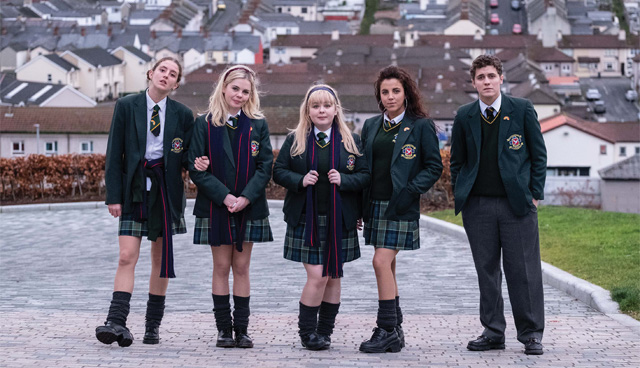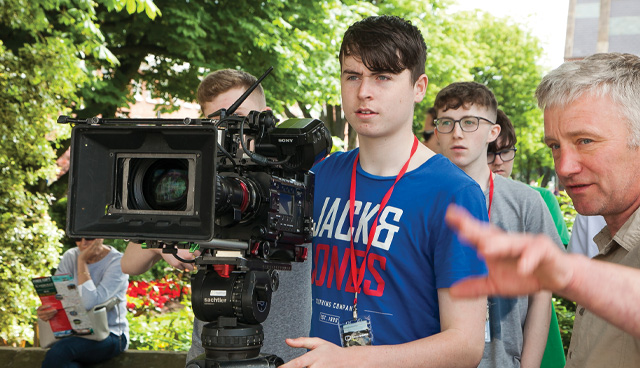Producing for the economy

With five major productions currently shooting in Northern Ireland, representing a high watermark for the screen sector, Northern Ireland Screen Chair, Rotha Johnston, says that the industry has a large role to play in the region’s economic recovery from the pandemic.
The continued success of screen production in Northern Ireland, even when faced with a pandemic, is testament to the resilience and ambition of the sector and all those within it, explains Johnston.
The outgoing Chair of Northern Ireland Screen exhibits her pride in the growth of the sector which she has witnessed over her eight-year tenure. Johnston points to evidence that the groundwork has been laid to enable Northern Ireland to continue to “punch above its weight” in attracting productions in the years to come.
Northern Ireland Screen is the lead agency for the film, television and digital content industry in the region. It has a role to support the development and production of screen content in Northern Ireland, both incoming and indigenous.
“We are committed to maximising the economic, cultural and educational value of the screen industries for the benefit of Northern Ireland. This goal is pursued through our mission to accelerate the development of a dynamic and sustainable screen industry and culture in Northern Ireland,” explains Johnston.
The organisation is funded by the Department for the Economy (DfE) and the Department for Communities (DfC), and is delegated by the Arts Council of NI (ACNI) to administer Lottery funding for film in Northern Ireland. It also receives some funding from the UK Government’s Department for Digital, Culture, Media and Sport (DCMS) in relation to its Irish language and Ulster-Scots funds.

Like many organisations, screen production and the wider network of those involved in the industry were hit with an initial shockwave when the pandemic broke. With the industry coming to a standstill, almost immediately overnight, Northern Ireland Screen moved to secure support for those affected.
However, as Johnston explains, given the variation of those involved across the industry, it quickly became apparent that seeking approvals and the introduction of Covid-safe regulations to restart production would be the best way forward for all.
“I am delighted to say that working in collaboration with the departments, we have been able to continue with production in Northern Ireland to the extent that we now have five productions currently shooting,” says Johnston.
The Chair estimates that some 1,500 people are currently working on productions in Northern Ireland, including the likes of Netflix’s first major production in Belfast, The School for Good and Evil, Paramount’s film adaptation of Dungeons and Dragons, the Normal People follow-up Conversations with Friends from Element Pictures and BBC’s daytime crime drama Hope Street.
“I don’t think we would have anticipated 10 or 20 years ago that we would have five major productions operating at the same time here, but it’s a result of many years of skills development and growth of film crews and it is important that we show that.”
Johnston says that the success is not just one for the industry but for the wider economy. “We estimate that, between February to July 2021, we have in excess of £70 million going into the economy as a result of those five productions. Notwithstanding the significant issues in relation to Covid, this means that hotel rooms are being filled, taxis are being used and hopefully soon, hospitality will benefit again.
“It is also important to recognise the reach that the industry has for job creation ranging from actors and agents through to painters, plumbers and electricians.”
Johnston is quick to point out that recent successes have not happened by chance and instead they have been the result of a long-term focus and collaborative effort over many years.
April 2021 marked 10 years since the first airing of Game of Thrones, the show often credited with transforming Northern Ireland’s screen industry and the Chair says that the attraction of the HBO production and other large-scale productions has been a result of much collaboration.
“Successive Executives and ministers have supported the screen sector and we are now seeing the benefits of long-term strategic investment. The direct economic impact is important as is the perception of Northern Ireland as a vibrant creative hub further afield. That strategic, long-term focus has allowed us to punch well above our weight.”

Highlighting the wider economic impact such productions can have, Johnston points out that in 2019, Tourism NI estimated that one-in-six visitors to Northern Ireland did so, at least partially, because of the connection to Game of Thrones.
The Chair explains that the legacy left by productions, like Game of Thrones form a large part of Northern Ireland Screen’s evidence base when trying to attract new productions to the region, highlighting the levels of skills and experience that exists in Northern Ireland.
Showcasing the innovation that exists in the organisation, Johnston outlines how Northern Ireland Screen recognised an opportunity during the pandemic, with many people locked down in their homes. The organisation has over 40,000 followers across its Twitter and Facebook social media platforms and quickly produced an awareness campaign with the hashtag MadeInNI.
Johnston explains that the aim of the campaign was to increase awareness of the vast amount, and variety, of content that Northern Ireland Screen supports. The campaign centred on the use of a back catalogue of Northern Ireland Screen supported projects across film, TV drama, children’s content, and games, which are all available on mainstream platforms.
Of the 71 projects in total highlighted by #MadeInNI, including 30 films, 18 TV dramas, 16 children’s projects and seven games, the organisation recorded over half a million impressions and over 13,000 engagements.
Alongside the campaign was an increased promotion of content from Northern Ireland Screen’s Digital Film Archive, first launched in 2000, which has seen an 80 per cent rise in visitors to its website since 2019.
“MadeInNI is a really important tool as we seek to project the image of Northern Ireland as a vibrant and creative economy, to a reach well beyond these islands. When you look to FDI mobile productions, that image is critical, and it is imperative that decision-makers know they are coming to a location where good things are happening and they are happening at scale.
“I don’t think we would have anticipated 10 or 20 years ago that we would have five major productions operating at the same time here, but it’s a result of many years of skills development and growth of film crews and it is important that we show that.”
Recovery: Inclusive growth
Johnston pays credit to not only public sector investment but also public-private partnerships which have helped expand Northern Ireland’s screen industry. The Chair points to the building and expansion of film studios, such as the £45 million planned expansion of Belfast Harbour’s film studios and the further expansion of Loop Studios, as examples of how the industry continues to grow its attractiveness.
Ambitions for even greater growth will form a key part of Northern Ireland Screen’s new four-year strategy, currently being developed by the organisation’s board and soon to be delivered to the Department for the Economy.
“I think the strategy will show that our ambitions have not diminished and that we see an opportunity for real positive growth and an increased contribution to the economy going forward,” the Chair states.
The opportunity that Northern Ireland Screen’s ambitions offer for inclusive growth, Johnston argues, are evident in the continued growth of the industry outside of Belfast, including in the north west.
The recent announcement that Hypixel Studios, the videogame developer behind the upcoming and much-anticipated title Hytale, is to establish its headquarters in Derry as part of its acquisition by US firm Riot Games, has been broadly welcomed.
The city is also set to host a third series of the hit TV show Derry Girls later this year. Northern Ireland’s first animated feature length film The Puffin Rock Movie, is currently in production at Derry-based media firm Dog Ears, it is a co-production with Kilkenny-based Oscar nominees Cartoon Saloon, and the China Nebula Group (CNB). Derry’s Alleycats TV has become a preferred supplier to network BBC winning two commissions from BBC Three in recent weeks.
“Inclusive growth is really important, not just in our strategy but in the overall economic ambitions for growth,” explains Johnston. “For this to happen we recognise the requirement to consistently support new talent across Northern Ireland. For example, our New Talent Focus scheme has been incredibly successful and has given many of our writers, directors, and producers opportunities to get their first credit on a feature film.
“Equally we manage the Ulster-Scots Broadcast Fund and the Irish Language Broadcast Fund, which have both integrated into the rest of the screen industry to the point where we are now seeing producers, editors and writers from those funds operating across sectors.”
Evidence that Northern Ireland Screen continues to look to the long-term future of the industry can be seen through its investment in skills and education, explains Johnston.
“Northern Ireland could have the best incentives and the best production facilities but if we don’t have the right skills for the screen economy then we will not be attractive and we will not be able to grow,” she says.
“Skills development is an inherent part of our strategy. Through our funding from the Department for Communities we support three Creative Learning Centres in Derry, Belfast, and Armagh in delivering skills development programmes for teachers and young people in digital literacy and in understanding and deploying creative technologies and new approaches to learning in the classroom as a support across the curriculum.
“A key objective for the centres has been to provide learning programmes for the most disadvantaged young people and those experiencing social exclusion. Over 80 per cent of centre activity takes place in schools with high numbers of disadvantaged pupils.”
Another opportunity described by the Chair and offered by Northern Ireland Screen is that of ScreenWorks, a scheme developed to help young people aged from 14 to 19 learn more about careers in the screen industries, through hands-on work experience opportunities.

Northern Ireland Screen has been instrumental in promoting and developing moving image arts as a qualification in schools, but the Chair acknowledges that further opportunity exists to expand Northern Ireland Screen’s collaboration to other areas, local councils, and further education colleges, adding: “It is important to note that part of our remit is to ensure that we are engaging with those beyond the formal education system, again ensuring inclusive growth.”
Interestingly, the Chair points out that screen production has now evolved into a broader range of services than the movies and TV dramas people traditionally associate with the title. Northern Ireland Screen’s academies work across five screen sectors, including animation, visual effects (VFX) and games.
“As we look to continue the development of the screen industry here in Northern Ireland it is important that we do that with the whole ecology for the sector. Recent years have seen the convergence of different screen technologies and we have moved away from the traditional setting of people sitting down at a certain time, to the operation of multiple screens in a household consuming different products from animation to games, film, and documentaries.
“In each of those areas we need bespoke approaches to how we can support that talent pipeline entering and within the industry.
“We want to ensure that Northern Ireland has a burgeoning screen economy and to carve out some of that incredible growth globally for the region.”
In July 2021, Johnston will hand over to a new Chair, currently being sought by the Department for the Economy, after what she describes as eight “privileged” years. Asked to describe the highlights of her tenure, the Chair says that she has enjoyed witnessing the “incredible creativity in Northern Ireland and the ability to bring that creativity and ambition to the screen”.
“The fact that we have such a volume of business coming through the pipeline is a credit to this great organisation and I think going forward it is important that we adopt a broad-based approach to each of the screen areas and that we are not dependent on one single area to realise our ambitions for growth,” she adds.
“That we have such large-scale productions coming time and time again is evidence of the skillsets and expertise that we possess in the screen sector. I am incredibly proud of the sector and the people in independent production, who, day in and day out, go in to make fantastic programmes and bring them to audiences around the world.
“The success of the screen sector in Northern Ireland is no accident, it has been a concerted effort. Going forward, I think it is important that we continue with a holistic strategy. Plan and commit resources long-term, continue to develop the talent pipeline and work collaboratively with the departments and organisations who can help grow the sector to deliver postive economic and social benefit for Northern Ireland,” Johnston concludes.
Profile: Rotha Johnston
Rotha Johnston took up post as Chair of Northern Ireland Screen in June 2013 and will leave the post in June 2021. A Queen’s University graduate, Rotha has had a career in the textile, economic development, and food sectors. She currently has various investment interests primarily in the property sector. In addition, Rotha holds a number of non-executive positions including Chair of Northern Ireland Electricity Networks and member of KPMG NI Advisory Board. Rotha is also a director at QUBIS and Ulster Garden Villages. Previously she was a shareholder and director of Variety Foods Ltd, a food service company supplying the Irish market; head of marketing in Moygashel Textiles, part of Lamont Holdings, and business development director, LEDU. Rotha was also a BBC trustee, Pro Chancellor at Queen’s University Belfast and Deputy Chair of Invest Northern Ireland.






